Ready to prefill? Market innovation to unlock growth in the market
Innovation is key to making reuse the choice for consumers – why prefilled returnable packaging could be the answer to brands’ & retailers’ prayers.
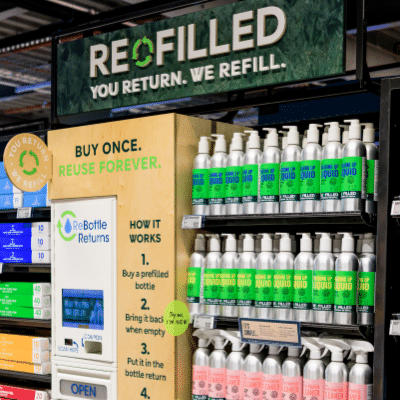
A NEW report reveals packaging innovation could pave the way to making reuse the everyday choice of consumers in UK supermarkets. The report ‘Ready to prefill? Market innovation to unlock growth in the market’ is a joint project between City to Sea and Re, and provides for the first time, insight into current consumer perceptions, barriers and motivations in relation to prefilled returnable packaging. The project has been part-funded UK Research & Innovation’s Smart Sustainable Plastic Packaging Challenge.
There is a significant opportunity for refillable, reusable and returnable packaging and consumer demand is there. In fact, despite consumer reluctance often being blamed for a lack of investment in circular systems, consumers are voicing their frustrations at the lack of provisions in place. So far, efforts have largely focused on recycling and reducing single-use packaging, rather than rethinking how to keep packaging circulating in the system. However, prefilled returnable packaging promises to overcome many of the problems that consumers experience with in-store refill.
The new research revealed:
- Consumers demand is high. Intention to buy is there – 69% of respondents indicated they are likely or very likely to try products in returnable packaging if they are available where they shop, but lack of availability is preventing trial.
- Prefilled returnable packaging presents a significant opportunity for brands. Over half of respondents (53%) said they were more likely to buy from a brand that offered products in prefilled returnable packaging, rising to 84% among those that had previously bought products in returnable packaging.
- Consumers are unwilling to compromise on price. Six in 10 indicated that value for money was the most important criteria influencing their product choice.
- However, almost half of respondents are prepared to pay a deposit for a product that they buy in returnable packaging.
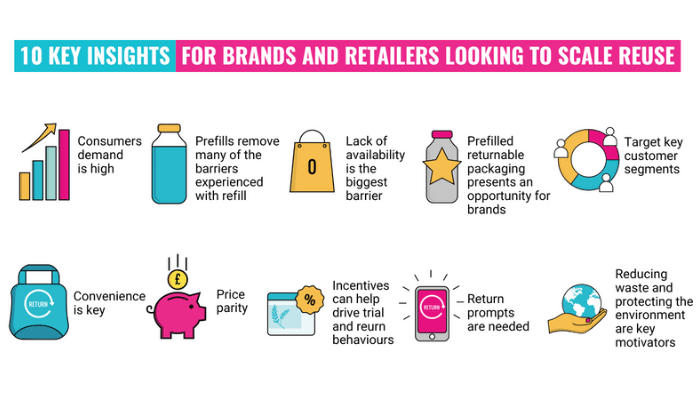
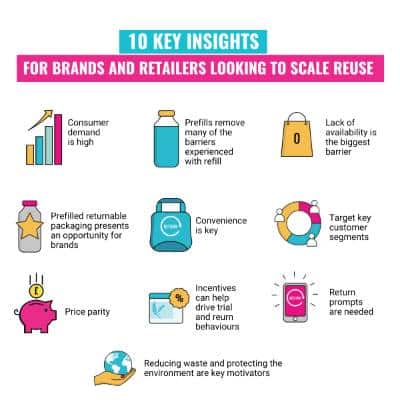
The report outlines recommendations for brands and retailers to maximise the opportunity help them meet their waste reduction targets and save money in the future, as we look ahead to the introduction of Extended Producer Responsibility and the associated costs this carries for retailers and brands.
%
of respondents said they’re likely or very likely to try products in returnable packaging if available where they shop.
%
would be willing to pay more for products in prefilled returnable packaging.
%
of people said they were more likely to buy from a brand that offered products in prefilled returnable packaging.
ENGAGING THE CONSUMER
Before we can encourage consumers to embrace prefilled returnable packaging, we need to know more about them. Our research revealed five key consumer groups and how likely each of them is to use prefills, provided a deeper understanding of their needs and motivations, and helped determine how to target them.
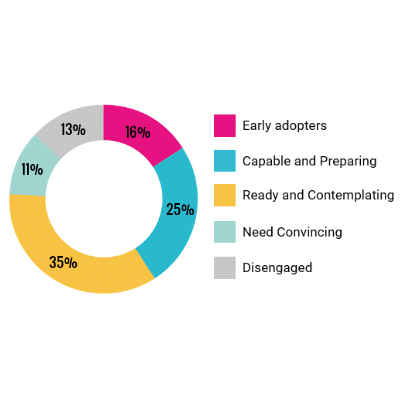
UK Extended Producer Responsibility legislation is moving from fixed fees to variable fees per type of packaging, increasing incentives for brands and retailers to drive return rates. This not only requires the process to be as simple as possible, but also to be accompanied by appropriate incentives and behaviour change intervention.
Most investment by brands and retailers to date has been in reducing packaging or making it more recyclable. Trials to date on reuse and refill have been limited and isolated, lacking collaboration and a longer-term vision. This report provides further evidence of a frustrated consumer demand and the need for stakeholder collaboration to accelerate the transition to reuse.
Ongoing concerns about the commercial viability of reuse mean few brands have set meaningful targets or timescales to roll pilots out more widely. This will only be solved through innovation, cross-industry collaboration and increased efficiency to unlock economies of scale. Re has set out to address these issues with a vision for a cross category, professionally refillable, reusable packaging platform that is consumer centric and centres around smart standardised returnable packaging-as-a-service to reduce the cost and risk barriers for stakeholders.
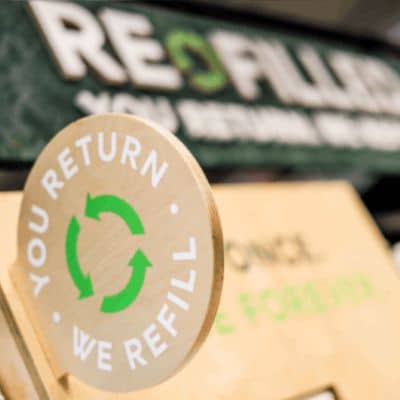
INNOVATION IN PRACTICE
The report includes case studies from retailers such Marks & Spencer’s, who have been running a prefilled returnable packaging trial in six of their stores since last year and have reported positive results to date. Sales have outperformed their forecast and some products, such as the citrus washing up liquid, have even beaten sales of the single use plastic-packaged equivalent in one of the pilot stores. The response from customers has also been positive and, as they look towards the future, the retailer is considering expansion of the range as part of its waste reduction strategy.
Marks & Spencer’s launched our ‘Refilled’ range as a pilot last year, building on the work we’ve already done across the organisation to reduce packaging and provide refill options for our customers. So far, we’ve been really pleased with how its progressing. The feedback from customers has been resoundingly positive, return rates have been high and some products have even outsold their single-use equivalent! Looking to the future, we’ve got plans to expand the range and are optimistic about the potential the system provides to help us meet our packaging reduction targets.
What’s next?
We hope this report provides you with confidence that listening to consumer voices, adopting behaviour change theories, and learning from cross-industry collaboration can help to unlock transformation from linear to circular, and from more, more and more to again, again and again. And our research doesn’t stop here.
Next, we’re going to take a deeper dive into consumer experiences and look at the differences between what people say and what they do. We’ll strengthen our understanding of target groups, and with the help of UKRI we’ll be looking at consumer attitudes on:
- The relationship between brands and packaging.
- Price and deposit sensitivity.
- Language and testing messaging via consumer workshops.
- Shopping journeys in retailers such as M&S offering products in prefilled returnable packaging.
Do you need further support from City to Sea and Re? Or maybe you have insights that add greater depth and colour to this research. We love to collaborate and have some amazing partners working with us to realise our vision of a reusable and refillable future. Please get in touch with Jane Martin, Head of Development, City to Sea.
This is a revolutionary approach, by collaborating on a full-system solution brands and retailers can effectively scale-up an effective reuse model that avoids the consumer barriers. It is clear to everyone that consumers want to shop more sustainably, our climate desperately needs us to but, to date the missing link has been the innovative solution – the future is prefill.




